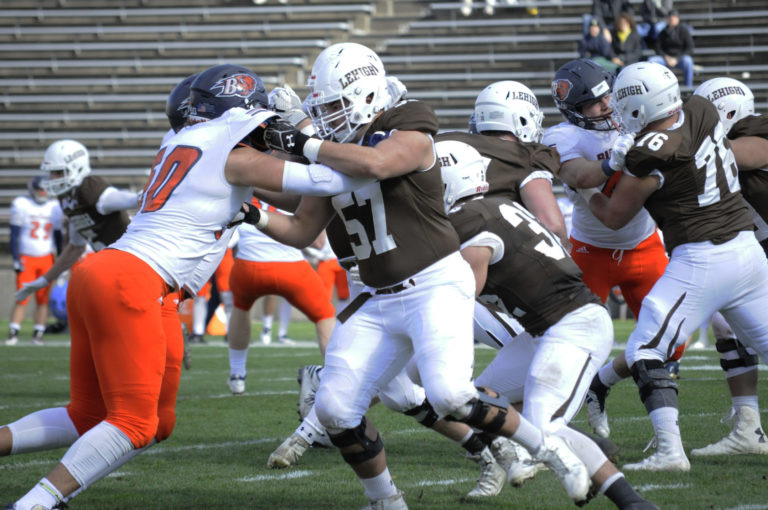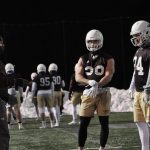For Lehigh, The Sacrifices Are All Worth It For the Chance to Play Spring Football

“What would not I give to wander
Where my old companions dwell?
Absence makes the heart grow fonder;
Isle of Beauty, fare thee well!” – Thomas Haynes Bayly, Isle of Beauty, 1844
At Lehigh, during a regular fall schedule, normal season-opening football games usually happen after a basically uninterrupted month of football work in the summer. They happen on grass fields in an athletic complex before having to worry about classes being in full swing. They happen in the hot, summer sun. And they are largely experienced as something that needs to be more endured than enjoyed.
This spring football season, scheduled to start this weekend for the Mountain Hawks, is anything but normal, of course.
Under a record February Lehigh Valley snowfall, every athletic team at Lehigh is competing for one usable artificial turf field, meaning the football team had to sometimes practice at 10 at night in the freezing cold, with piles of snow on the sidelines. The athletes are working through a full-blown academic workload, in the thick of the semester, while all of this preparation is going on.
But there wasn’t any frustration this week from LB Pete Haffner, who, like his teammates, has waited more than a calendar year to get back onto the field in a competitive situation.
“Once practice starts, and that first whistle blows, you get on the field, and we’re just back to playing football,” he said this week. “We’re back to doing our drills, even though we’re socially distanced, but it just feels great. Just being back out there and really competing with your friends, my teammates and coaches – it’s been a lot of fun getting back out there.”
For this Lehigh team, who has gone through this unique journey back to playing games that count, it feels like this weekend is almost as much a celebration of what football means to them as much as it is a Patriot League conference game against Holy Cross at Murray Goodman Stadium at noon this Saturday.

Sacrifices
Lehigh University’s first football athletes donned uniforms to play football in 1883, when a team of sophomore students played a scrimmage against Penn’s sophomores on December 3rd.
Since that December day more than a hundred years ago, through season after season, Lehigh fielded football teams yearly through world wars, the transformation of the game of football, and even the influenza pandemic of 1918. The gap between completive games was never more than a calendar year, from their very first meeting against Lafayette in 1884 to the last time they played their archrivals back in 2019 for the 155th time.
The CoVID-19 epidemic necessitated a pause of Lehigh football activities and, for the first time in program history, meant there was more than a year gap between college football games. When Lehigh suits up against Holy Cross this weekend, the gap will have been 476 days.
Managing the epidemic has meant in the case of OL Chris Fournier, the Mountain Hawks blind side tackle, he’s had to make big personal sacrifices to take the field this spring.
Fournier, a civil engineering major, hails from Orleans, Ontario. He went back home around spring break in March of 2020, when Lehigh’s campus shut down, and was there until early July remote learning, weight training at home.
“Thankfully my family is pretty athletic,” Fournier said. “When I was back home, we have a weight set in the basement, so I was good there. Coming back here, one of my roommates actually has a weight set too, so I’ve been been pretty privileged. I know some guys aren’t in that situation. We’ve had workout programs for the guys who couldn’t get access to things like that, and like those were good workouts, too, using objects around the house and stuff like that. But thankfully I was in a position where I was able to keep a pretty solid routine.”
The Canadian border has been basically closed almost as long as the CoVID-19 pandemic has been raging through the world – people cannot travel freely to and from Canada, even today. Heading back to campus to attend school and play football meant making a decision to head to Bethlehem and not being able to easily go to and from home.
“As soon as I heard that we’re going to be having a season, that allowed me to get through the border because it would be considered a necessary travel purpose. I came back to campus and I’ve been here ever since. I talk to my family over the phone, video chats, stuff like that. Obviously, it’s not the same. But it’s something.”
LB Pete Haffner hails from State College, PA, so he’s a lot closer to home. A finance major, he’s still had to quarantine himself away from his family in order to play football, too.
“So, the last time I was with my family was in the middle of January,” he said, “and we had to report to school a week or two early before camp [to quarantine]. Then camp started February 1st, so I haven’t seen my family since the middle of January.”
Through Lehigh’s management of CoVID through the fall of 2020, practicing for football has been a challenge.
“The hard part of it is that we really didn’t get to practice from November of 2019, until last month,” head coach Tom Gilmore said. “The first practice we had was Friday February 12th. That’s a really long layoff.”
Due to Lehigh’s re-opening plans and lockdowns, Lehigh’s scheduled fall 2020 practices, which would be the equivalent of a spring practice before a fall season during a normal year, never were able to happen.
“Unfortunately we had 11 workouts in the in the fall and that was it,” Gilmore said. “We would have been better from an athletic standpoint if our players were not here, as it turned out, because during the lockdown said no access to facilities or anything like that, and potentially some of them at least could have been doing that in their home community. I think that was the biggest difficulty, because we had to navigate trying to get them back into football shape, trying to get them refining their skills and start preparing for games.”
The good news is that the past few weeks have seen a return to normalcy – at least what passes as normalcy in terms of frigid preseason practices in February with a game that counts in March.
“We’re super excited just like any opening day, just to be out on the field and playing,” Haffner said, “but I think it takes on a little bit more of a special meaning because of all the sacrifices that we’ve had to endure to get out on the field. We’re kind of limiting our social life, not seeing our families, so it really just means a lot more to get out on the field, and all the guys out there [practicing] you know really love football, really love Lehigh Athletics and really love being a part of the team.”

Routine
Football preparation is all about routine, and it’s been quite different having full-blown practices this time of year. Both Fournier and Haffner stressed the importance of time management when it comes to navigating their challenging academic workloads.
“The academic piece has been a challenge throughout the whole career of being an engineer and doing football,” Fournier said. “But I’ve found a pretty good balance at this point, so it hasn’t been too bad. I feel comfortable with all my classes, and time management is such a big thing, especially with moving schedules all the time and stuff like that. That’s been a really key piece to make sure you’re being proactive, and that’s what I’ve done to make sure I’m on top of all that.”
“It’s pretty tough balancing football camp and 15-17 credits of classes,” Haffner said, “We usually have some kind of football in the evenings, so you get your work done during the day. One of the hardest parts about being a college football player is time management, it’s pretty much like balancing a full-time job and being a full-time student. So this [experience] really proved who wants to be a college football player. It’s been difficult, but manageable at the same time.”
For the freshmen, this strange fall of no football and this spring season is all they know, so Haffner reminds them that this isn’t how it usually is.
“We definitely let them know, as a senior class,” Haffner said, “kind of like how we do things and what is right, but we do end up saying ‘we would typically be doing this at camp’ and it’s been weird. I feel bad for them. They kind of miss a lot of the typical experiences, not only as football players, but as a college students.”
“We’ve had a lot of time to work with the new guys with this extended period, Fournier said. “I feel like as a group we’re pretty tight, and I feel good about where the offensive line is at with the run game. Coaches tweak some things and we are coming at it with a little bit different approach, but I’m pretty confident with how the running game is going to be.”
Everyone attending Lehigh this spring, and especially those playing football, certainly are missing out on some of those experiences, but for the football players the routines really help.
“At the start the practices were a little bit chaotic with the poor weather, but the past couple weeks we really got into a routine,” Haffner said. “We’ve staggered exits of the locker room, offense and defense, to start at different times, which was a little strange at first to get used to. But once the practice starts and that first whistle blows, you get on the field and – it’s just football. We’re back to playing football.”
For this Lehigh team, it’s certain that the absence of football for more than a calendar year has made the little things that much easier to do in preparation for the spring season.
“The kids, the players, and the coaches so much appreciate the opportunity [to prepare for this season],” Gilmore said. “You wouldn’t know we’re going through all these other challenges because of the attitude, the motivation, the whole atmosphere around the program has been so good despite those challenges. When we actually get on the [practice] field, we’re playing football again, even if it’s at 10 o’clock at night, even if it’s cold as hell, even if there’s ten foot snow banks around you.”
“As far as the team itself is concerned,” Gilmore continued, “the seniors have been great. I mean, they’ve given up a lot of things. They’ve sacrificed a lot to do what we’re doing, and I’ve been really impressed with what they have done. That’s the difficult part, not having any kind of social life. At the initial part of the semester, they weren’t allowed to hang around with anyone. But the guys have been disciplined, they’ve been resilient, and the motivation really shows in the way that they’re conducting themselves. It’s been really impressive, and then when they get on the field their enthusiasm and their attitude has really made it a pleasure to work with them.”

Chuck has been writing about Lehigh football since the dawn of the internet, or perhaps it only seems like it. He’s executive editor of the College Sports Journal and has also written a book, The Rivalry: How Two Schools Started the Most Played College Football Series.
Reach him at: this email or click below:
